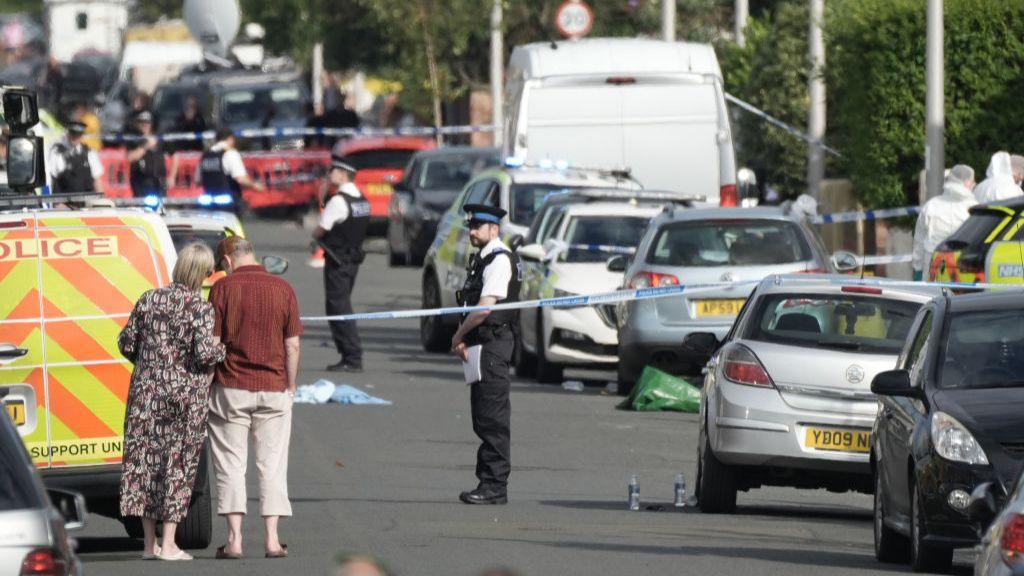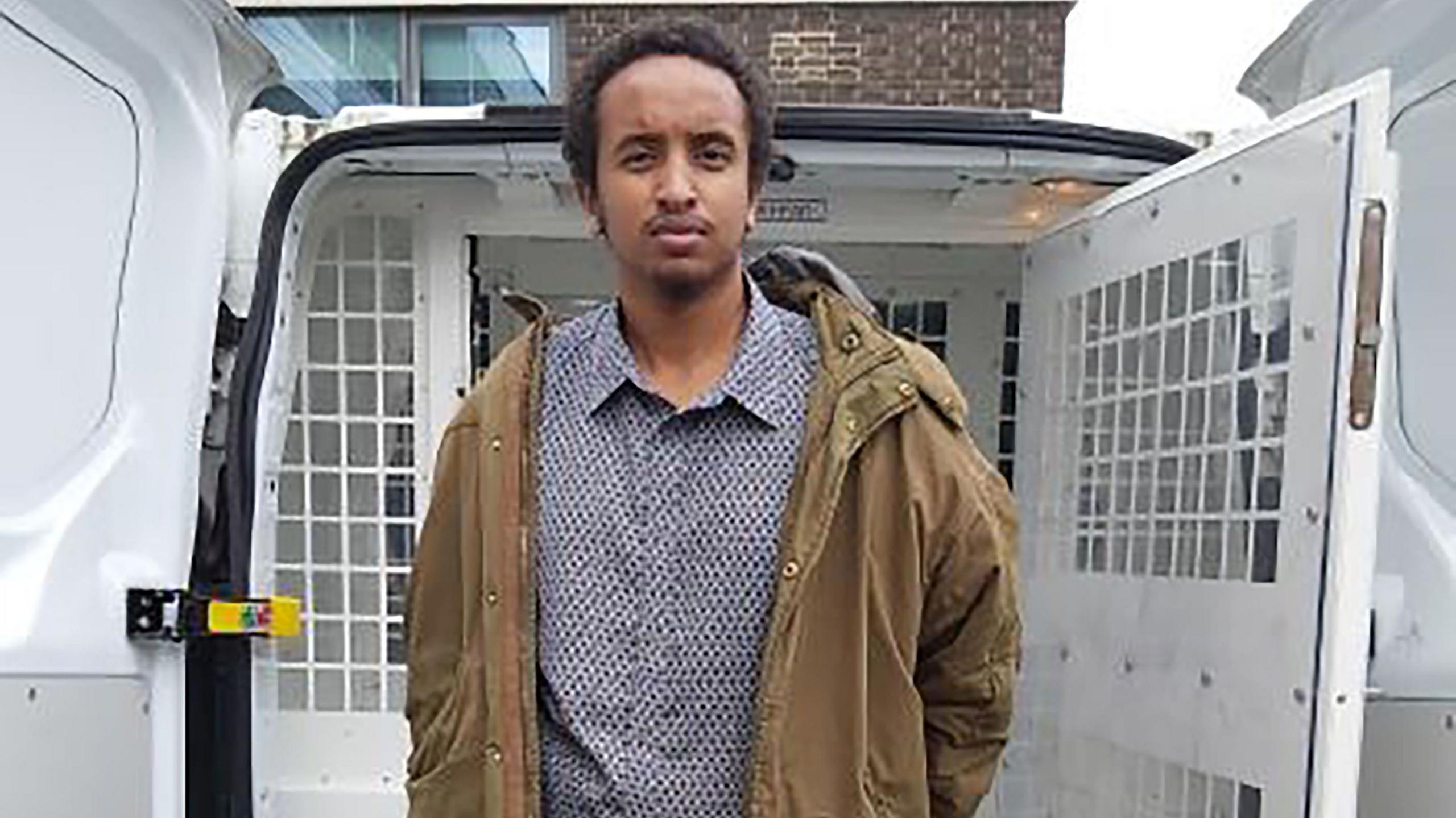Prevent missed chances with Southport killer, says review

Three young girls were murdered and 10 children and adults were seriously injured by Axel Rudakubana in July 2024
- Published
The Prevent counter-terrorism scheme missed an opportunity to intervene in the life of the Southport killer, a major review has concluded.
Axel Rudakubana could have been monitored, treated and potentially turned away from violence by the programme, said Lord David Anderson KC.
He said the government programme must focus on changing people obsessed with extreme violence, even if counter-terrorism police find no evidence of an ideological motive.
Teachers warned Prevent officials three times that Rudakubana was obsessed with violence - but on each occasion his case was closed because he did not seem to have a identifiable terrorist motive.
The review also looked at failings by Prevent in the separate and earlier handling of an Islamic State supporter who went on to murder MP Sir David Amess at a constituency surgery in Leigh-on-Sea in 2021.
Prevent boss leaves role after Southport failings
- Published28 March
Officers who confronted Southport killer honoured
- Published11 July
Southport survivor fought to save others, says mum
- Published9 July
Lord Anderson, the independent Prevent commissioner, called for the Prevent system to do more to identify future attackers from their public social media activity - and said the scheme should be part of a wider plan to identify people who may carry out acts of extreme violence.
Rudakubana is serving a life sentence with a minimum of 52 years for murdering Bebe King, 6, Elsie Dot Stancombe, 7, and Alice da Silva Aguiar, 9, after he walked into a Taylor Swift-themed workshop in Southport, armed with a knife.
He seriously injured eight more girls and two adults who had tried to stop him.
Between 2019 and 2021 teachers referred Rudakubana to Prevent three times, under a national duty to alert police and other agencies to potential extremists.
In each area of the UK a local panel of agencies, headed by the police, assesses whether a flagged individual needs specialist help, such as counselling, to change their views.
But on each occasion that teachers flagged Rudakubana, his case was rejected.

Rudakubana is serving a life sentence with a minimum of 52 years for murder
Lord Anderson said he commended the teachers who had raised concerns but said Prevent had failed to take an opportunity to act. It would be for the judge-led Southport public inquiry to investigate the decisions taken by individual officials.
"It's a failure of the system. What I have seen is enough for me to be pretty sure what Prevent needs to learn the lessons from Rudakubana," said the senior barrister.
"It has to be made clear that these so called violence-fascinated individuals do fall within its scope.
"Although Axel Rudakubana had an obsessive interest in extreme violence... he did not have a fixed ideology.
"That means, in strict law, he couldn't be sentenced as a terrorist.
"Does that mean that Prevent should have had nothing to do with him? It doesn't.
"There was already guidance saying that if people had these so called mixed, unclear or unstable ideologies, or indeed, if they were obsessed with school massacres, which was certainly one of his interests, they very much were eligible for Prevent."
Lord Anderson said Rudakubana could have been referred to an expert mentor who, in turn, may have been able to change him.
"It doesn't always work, but if you get the right mentor saying the right things at the right time, the effects can be quite remarkable," he said.
"Nobody can know whether that would have happened in Rudakubana's case. But Prevent was given a chance. It didn't take that chance. And that is very, very regrettable."
Lord Anderson said Prevent had to "up its game" in the online world where most radicalisation now takes place.
He said that in the case of Rudakubana a teacher had reported some of the extreme material he was looking at in school - and there may have been opportunities to look at what he was posting online.
Prevent should spend more time looking at what potential extremists are posting publicly, he said, and that this work could be done without asking the police and MI5 to devote covert resources and secret intelligence-gathering techniques to someone who may not turn out to be dangerous.
Chris Walker, a solicitor representing the three bereaved families in the public inquiry into the Southport killings, said the review highlighted "failings" in Prevent.
"Lord Anderson is right that lessons must be learned and we call upon the government and authorities to ensure they do more than simply paying lip service," he said.
He added: "We now turn to the inquiry in establishing the key decisions that were made in this case, who made them and how, if they had not been made, would the results have been different."

Islamic State fanatic Ali Harbi Ali was given a whole-life sentence for murdering Sir David Amess MP
In the case of the murder of MP Sir David Amess in 2021, teachers had flagged to police that Ali Harbi Ali was potentially dangerous, and a Prevent panel in London sent an expert mentor to meet the teenager and to challenge his evolving ideology seven years earlier.
But the mentor only had one meeting with him and his case was closed without anyone being sure whether he had changed.
"In the case of Ali Harbi Ali, there was a string of failures in the way Prevent worked," said Lord Anderson.
"They were a consequence, largely of human error. Since that time, Prevent has professionalised enormously.
"All sorts of procedures are in place, all sorts of guidance, all sorts of training, and I conclude that, taken together, those changes make it much less likely that human error of that kind will occur again."
Radd Seiger, adviser and spokesperson for the family of Sir David, said they are "deeply upset" and "frankly offended" by the way Lord Anderson's report has been handled by the Home Office.
He said the family were given "next to no notice" of the timing or advance sight of the report, adding media leaks were a further insult to the family.
Mr Seiger said they also received a "dismissive" letter from the home secretary, which he said was designed to "protect the government following its failings" and not support them.
Home Secretary Yvette Cooper said the government will "immediately act" on Lord Anderson's findings.
In a written statement, she said front-line workers who have a duty to refer individuals to Prevent will get guidance so they understand those fascinated with extreme violence or mass casualty attacks should be referred to the counter-terror programme.
Cooper also said work will continue to look at how Prevent connects with wider violence prevention and safeguarding efforts, and officials will work with tech companies to boost efforts to tackle online radicalisation.